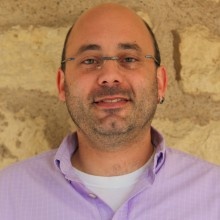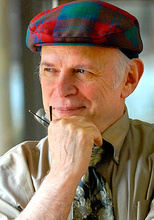A new kind of research is at the heart of this June’s Obermann Summer Seminar. Based on a model of civic science, the seminar will bring together educators, developmental scientists, policy makers, and parents to consider how to improve school readiness for Iowa’s three- to five-year olds.

“We are trying to stay very open to possible outcomes,” says John Spencer, Director of the DeLTA Center and professor in psychology (CLAS). Spencer (pictured left) has helped to design the unique seminar that he hopes will fully engage the wide range of attendees. Get Ready Iowa: Partnering to Enhance the School Readiness of Iowa’s Children begins June 13 with a group of about 20 participants who will discuss the concept of civic science and imagine the ways scientists and citizens might work together to solve real-world problems. The next two days, June 14-15, will expand to a larger group of nearly 100 participants from around the state and will include presentations by leading researchers studying school readiness. On June 16, researchers from UI and community partners will come together to explore ways to collaborate in the coming year to foster school readiness. Together, they will create action items and next steps.
Spencer’s central goals are to identify the many resources and capacities that exist in Iowa to enhance children’s emerging cognitive abilities and to focus these capacities in an effective manner. He hopes that the core group will inform and take ownership of initiatives that grow from the seminar.
Spencer’s own research centers on cognition and development and uses ideas from dynamic systems theory. Researchers who use this approach assume that thought processes develop from the ground up as infants and young children actively engage with the world around them. For instance, Spencer’s research team is currently studying behavioral approaches, neural network modeling, and brain imaging to understand how 3- to 4-year-olds learn to adapt their behavior as they move from one situation to the next.
For this to work, everyone needs to be empowered and bring their unique capacities and resources to the table.
Although his work pertains to how young children learn and develop new cognitive abilities, the application of his findings from the lab to the real-world settings in which young children learn is relatively new for him. Ten years ago, Spencer says, it never would have occurred to him to direct an effort like Get Ready Iowa. But recent data have convinced him that, on one hand, laboratory or “basic” research can have a big impact on how parents and educators think about school readiness, but also that, on the other hand, scientists benefit when their research is integrated with the vast knowledge that parents, teachers, and policy makers bring to the table. This is one of the key insights of the civic science perspective.
“For this to work,” he says of any plan to improve how Iowa’s youngest children are prepared for school, “everyone needs to be empowered and bring their unique capacities and resources to the table.”

Community building will be key to any future initiatives born from the Get Ready Iowa summer seminar. “The people who have the capacity to make an impact must be involved from the beginning,” says Spencer. To help foster this sense of shared and equal agency, Spencer has invited two leaders in civic science: Harry Boyte, Director of the Center for Democracy and Citizenship at Augsburg College (pictured left), and Dennis Donovan, also from the Center for Democracy and Citizenship and a former school principal, who is skilled in community organizing and helping people engage in effective “public work.”
“Both of them encourage a grass-roots, agency-based perspective on efforts to overcome complex, real-world challenges,” Spencer says of Boyte and Donovan, who, alternately, will lead the two smaller sessions on the first and final days of the seminar.
Spencer is already working with Boyte on a national project, the American Commonwealth Partnership (ACP). In January, Spencer represented The University of Iowa at the launch of the ACP in Washington, DC. ACP, which Boyte directs, aims to re-think science as a tool of human empowerment and civic agency—making science more relevant to the daily lives of citizens and also changing the process of how science is done to invite reciprocal dialogue between scientists and citizens.
Spencer is excited that local educators and policy makers will be able to hear from researchers presenting their work during the June 14-15 sessions. Highlights from these two days include Susan Levin of the University of Chicago, talking about improving the numeracy skills of children from low-income families; Karin James, from Indiana University, presenting her findings that demonstrate how writing, as opposed to keyboarding, activates parts of the brain called the “reading circuit”; and Jen Kotler of the non-profit arm of Sesame Street, discussing media interventions.
Members from the Iowa City educational community, as well as those from Columbus Junction—a school district that has an ongoing relationship with the Delta Center—will be involved in the more focused group dialogues. Other educators, parents, and community members are welcome to attend a public talk at the Iowa Children’s Museum on Thursday, June 14 at 7 pm, when Dr. Scott Sampson, an archaeologist and the creative director of the TV program Dinosaur Train, will discuss the Museum’s role in early learning and media production.
“This seminar presents a unique opportunity to re-shape the landscape of school readiness in the state of Iowa,” says Spencer. “We’ve assembled an outstanding group of people who are all dedicated to enhancing the lives of young children in our communities.”
